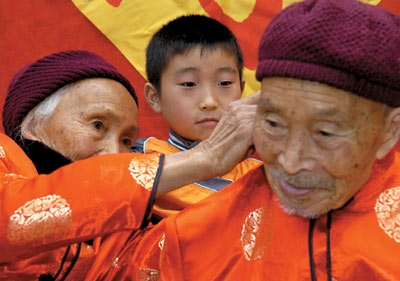 |
 |
 |
 |
 |
| Health and Medical Care | ||
|
China has 1.52 doctors and 2.45 hospital beds for every 1,000 people. In Beijing, Shanghai, Tianjin, Chongqing and other large cities, general traditional Chinese medicine and hospitals specializing in, for example, cancer, cardio- and cerebro-vascular disorders, ophthalmology, dentistry and infectious diseases can be found. Medium-sized cities throughout China have general and specialized hospitals with modern facilities. Medical treatment, disease prevention, and health-care networks have taken shape at county, township and village levels. With the establishment and development of health and medical-care organizations and the gradual spread of good hygiene habits, infectious and parasitic diseases that were formerly the major killers have been replaced by cancer, cardio- and cerebro-vascular diseases, creating a mortality pattern close to that of the developed countries. The health of urban and rural residents has been greatly improved; the average life expectancy is now 72.95 years, close to the level of medium developed countries.
Residents of Baibuting Garden Community, Wuhan doing morning exercises "Prevention first" is one of the important principles in all China's health-care work. All administrations have established hygiene and disease-prevention organizations responsible for overall management of these functions including hygiene and epidemic prevention stations, forming a nationwide network of hygiene supervision and control. In May 2003, the State Council issued the Regulations on Public Health Emergencies, establishing a legal framework for tackling public health crises. Furthering its cooperation with the World Health Organization, the state is planning significant investment in a system to handle all public health crises, improving the responsiveness and capabilities of emergency centers, treatment and hospital information systems. In recent years, reform in medical care and changes in the make-up of society have prompted the spread to most cities of community-based health services whose major role is prevention of diseases but which also provide treatment and health-care. The community-based health services are being welcomed by urban residents. These popular organizations are geared to handle at grassroots level problems arising from increased urbanization, an aging population, changes in disease patterns and social strata. Now, community-based health service networks have been established in large and medium-sized cities, with community health centers as the mainstay, supplemented by other medical agencies at grassroots levels.
Centenarian couple, Wu Yongqing (right) and his wife Zhao Xiaoyun (left) and their great-grandchild (center) at their 100th birthday celebration, Dongyi Village, Chengdu In 2003, China embarked on a new rural cooperative medical care system. Based on major illness health insurance coverage, the system operates on a payment plan by the individual, financial support from the collective, and subsidies from the government. If a farmer who has joined the scheme is hospitalized, incurred costs can be reimbursed accordingly on a sliding scale. This medical care system is expected to cover the whole country by 2010. Meanwhile, China has implemented a medical-aid system for rural areas offering medical aid to poor farmers who are seriously ill. A standardized rural medical-aid system has been established throughout the country. The fund, raised from special allocations at various levels of government and from voluntary donations from society, will be used exclusively for medical aid. |
| Copyright © China.org.cn. All Rights Reserved E-mail: webmaster@china.org.cn |

